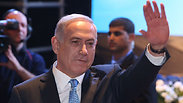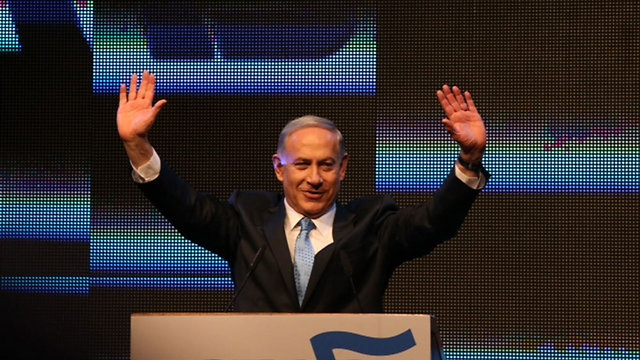
This was no election-driven escalation
Op-ed: Legend may have it that security tension plays into ruling government's hands; history proves this is not the case, so it's unclear where rumors of Netanyahu's desire for an escalation started.
Against the backdrop of the goings-on in the Middle East, Wednesday's incident was hardly a speck. Radical Islam is responsible for murdering around 2,500 people a month. That's some 83 individuals every day. And that's not even the complete picture.
A week ago, 18 Jihadists and five Lebanese soldiers were killed in a clash near the town of Arsal. They and those killed in the bombings and wars are not included in the reports about the Jihad's handiwork. This is the new Middle East.
Despite the fact that Israel appeared momentarily to be on the brink of a return to the days of Operation Protective Edge, the incident appears to have been a one-off. It's not a flare-up ahead of the elections. Maybe, just maybe, it was the response for which Israel had been waiting for 10 days – not an incident that opens the way to an escalation, but an incident that comes to end the tension.
It's not just a new Middle East. It's a strange Middle East. It's a Middle East in which blood vengeance is becoming the closing note. A temporary finale at least. After all, there'll be more to come.
Legend has it that security tension plays into the hands of the ruling government. Let's see. In May 1992, 15-year-old Israeli schoolgirl Helena Rapp was murdered in a stabbing attack, one of the more prominent in a spate of stabbings that took place in the country in the early 1990s. In the elections that took place that same summer, Yitzhak Shamir lost to Yitzhak Rabin.
In 1996, acting prime minister Shimon Peres embarked on Operation Grapes of Wrath against Hezbollah. In the elections that followed immediately thereafter, the Israeli Arabs chose to stay away from the polling stations; and Peres lost to Benjamin Netanyahu. The fall of 2000 saw the start of the second intifada, which soon turned more intense. In the elections held on the backdrop of this escalation, Ehud Barak lost to Ariel Sharon. And prior to the 2009 elections, Israel launched Operation Cast Lead. The Kadima government fell. Netanyahu became prime minister.
So where the occasional rumors regarding Netanyahu's desire for an escalation come from is not quite clear. And the same can be said for Meretz leader Zehava Gal-On's determination that "we've had bad experiences when it comes to a security escalation on the eve of elections." Who is this so-called we? After all, the ruling government, for the most part, emerges the loser from an escalation, while the opposition usually benefits.

Before Operation Protective Edge, Netanyahu made every effort to appease Hamas – to no avail. He doesn't need another round against Hezbollah. So there's no need for the standard nonsense about Netanyahu the warmonger. If there is something to be concerned about, it stems from the fact that Netanyahu will be striving for restraint; although maybe, just maybe, there is no need for restraint.
Capitulation to terror
The Sky News network interrupted a live feed this past week to prevent a French journalist from displaying the cover of Charlie Hebdo. The capitulation to terror continues – at a furious pace even. The British media outlets aren’t the only ones waving a white flag; the same is happening in France. French-Algerian artist Zoulikha Bouabdellah recently withdrew one of her pieces from an exhibition in a northern Paris suburb with a large Muslim population after an Islamic group warned local authorities that the artwork could provoke “uncontrollable, irresponsible incidents."
The warning is no different to the one issued here in Israel a week ago by MK Masoud Ganaim, a member of the Islamic Movement, who said that Netanyahu and the Steimatzky bookstore chain would be responsible for the unforeseeable consequences of selling the Charlie Hebdo issue in Israel. So there's no need to demand a show of courage from Steimatzky when the free world is folding. Why upset anyone? Why cause trouble? After all, we already know what could happen.
One can certainly argue over what is permissible and what is not – and not everything is permissible. Charlie Hebdo has had a go at everyone. It has made fun of Jews and Christians just like it has made fun of Muslims. Nevertheless, no Christian or Jew is known to have threatened the magazine with violence or terrorism for trampling their most sacred beliefs.
Thus, the problem is not freedom of speech. The problem is the Islamic response. The problem is the explicit and implicit threat of violence. The problem is that hundreds of thousands of Muslims around the world did not come out in protests against the acts of murder in Paris. The problem is that not only do they fail to condemn the murderous acts, they even use them to make threats. The problem is that too many intellectuals, Muslims too, offer understanding and justifications for the violence and terror. They pay lip service of course to the condemnations, with the addition of a "but" that becomes their principal point.
Author Salman Rushdie came out with a harsh attack on those who add the "but," branding them the "But Brigade." As Rushdie put it: "The moment somebody says, 'I believe in free speech, but,' I stop listening." I know, Rushdie said, that this "but" comes to offer justifications for terrorism and violence.
Moreover, the Muslim world is abundant in virulent anti-Semitic cartoons. Those who want their own sensitivities taken into consideration show little consideration for the sensitivities of others. There are brave voices too. Mehmet Sahin, a young Muslim from the Netherlands, and Mohammed Mansour, a young Palestinian Muslim from Germany, play an active role in the fight against anti-Semitism in the communities in which they live. Both require 24-hour-a-day protection.
Different times may have called for protests against the mockery and insult. But the members of the hypocrisy brigade who make threats and justify the violence are the last ones who should be crying foul. If they're against mockery, then they should be against all types of mockery. But until that happens, a mirror should be held up to their faces: That which is hateful to you, don't do unto others.










